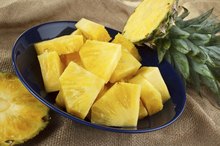What does fact checked mean?
At Healthfully, we strive to deliver objective content that is accurate and up-to-date. Our team periodically reviews articles in order to ensure content quality. The sources cited below consist of evidence from peer-reviewed journals, prominent medical organizations, academic associations, and government data.
- Seminars in Nephrology: Citrate Transport by the Kidney and Intestine
- Seminars in Nephrology: Citrate Transport by the Kidney and Intestine
The information contained on this site is for informational purposes only, and should not be used as a substitute for the advice of a professional health care provider. Please check with the appropriate physician regarding health questions and concerns. Although we strive to deliver accurate and up-to-date information, no guarantee to that effect is made.
Citric Acid in Pineapple
Many types of fresh fruit, including pineapple, contain citric acid, which gives fruit its tart flavor 4. However, while numerous components of pineapple contribute to its nutritional value, citric acid does not 4. Citric acid won't hurt you, but it may contribute to acid reflux.
If you are experiencing serious medical symptoms, seek emergency treatment immediately.
Pineapple
Pineapple, whether fresh or dried, contains large quantities of carbohydrates, which your cells use for energy 4. It also contains the antioxidant vitamin C, or citric acid. A statement from Columbia University explains that foods high in citric acid don't actually cause acid reflux, but the acid can make stomach contents more acidic, and therefore more irritating to your esophagus.
Citric Acid
Nutritional Facts of Pineapples and Mangoes
Learn More
Citric acid is very common in nature, occurring not just in fruits, but also in the cells of almost every living organism. The cells of the human body make citric acid as they burn carbohydrates, fats and proteins for energy. However, this does not mean citric acid will make you feel more energetic.
Uses in the Body
When you consume pineapple, you absorb citric acid into your bloodstream via the intestine, explains Dr. A. Pajor in a 1999 article published in the scholarly journal "Seminars in Nephrology." From there, most of the citric acid you've eaten gets filtered into the urine 4. Some of your cells -- primarily liver cells -- use a very small amount of citric acid from the blood and convert it into fat. The quantity is nearly inconsequential, however, in the context of your diet.
- When you consume pineapple, you absorb citric acid into your bloodstream via the intestine, explains Dr. A. Pajor in a 1999 article published in the scholarly journal "Seminars in Nephrology."
- From there, most of the citric acid you've eaten gets filtered into the urine 4.
Other Uses
Vitamins & Minerals in Pineapple
Learn More
Citric acid in pineapple, while rather unimportant from a nutritional perspective, has some industrial significance 4. In a 1995 article published in the scholarly journal "Biotechnology Letters" and written by Dr. Chau Tran and colleagues, pineapple scraps yielded very high levels of citric acid when the scraps were fermented by fungus 24. This is of interest in the food industry because citric acid is a common preservative in processed foods, and also increases foods' tartness.
Related Articles
References
- Seminars in Nephrology: Citrate Transport by the Kidney and Intestine
- Biotechnology Letters: Pineapple Waste - A Novel Substrate for Citric Acid Production by Solid-State Fermentation
- Columbia University: Eating Tips When Heartburn Hits
- Drugs.com: Pineapple
- Center for Science in the Public Interest. "Chemical Cuisine — Learn about Food Additives." https://cspinet.org/eating-healthy/chemical-cuisine.
- Codex Alimentarius, Food Additives Online Database. "Codex General Standard for Food Additives (GSFA) Online Database." http://www.fao.org/fao-who-codexalimentarius/standards/gsfa/en/.
- Max B, Salgado JM, Rodríguez N, Cortés S, Converti A, Domínguez JM. "Biotechnological Production of Citric Acid." Braz J Microbiol. 2010 Oct;41(4):862-75. http://www.ncbi.nlm.nih.gov/pmc/articles/PMC3769771/.
- United States Food and Drug Administration Database of Select Committee on GRAS Substances (SCOGS) Reviews"Citric acid." http://www.accessdata.fda.gov/scripts/fcn/fcnDetailNavigation.cfm?rpt=scogsListing&id=82.
- University of Wisconsin Hospitals Health Information: Health Facts for You. "Kidney Health: Citric Acid and Kidney Stones." http://www.uwhealth.org/healthfacts/nutrition/353.html.
Writer Bio
Kirstin Hendrickson is a writer, teacher, coach, athlete and author of the textbook "Chemistry In The World." She's been teaching and writing about health, wellness and nutrition for more than 10 years. She has a Bachelor of Science in zoology, a Bachelor of Science in psychology, a Master of Science in chemistry and a doctoral degree in bioorganic chemistry.









